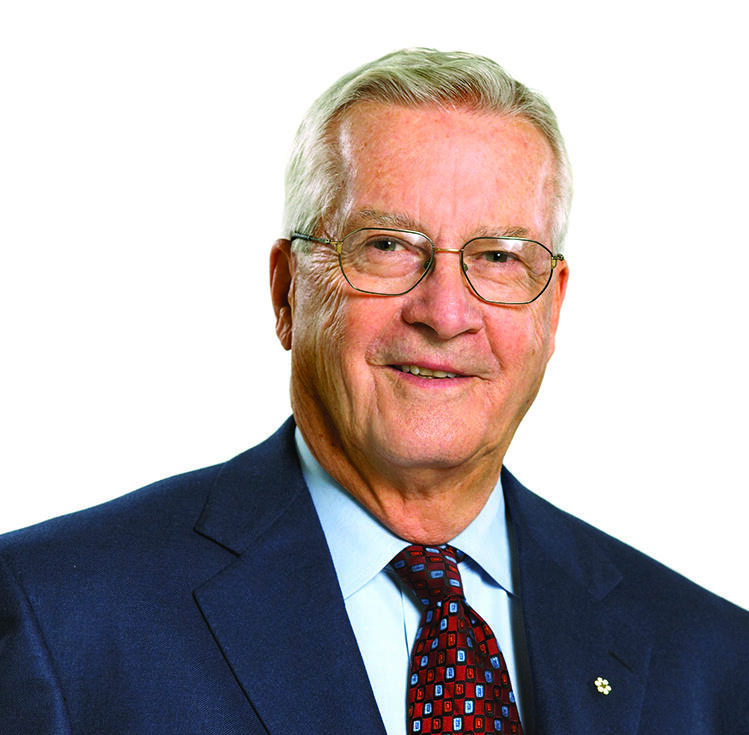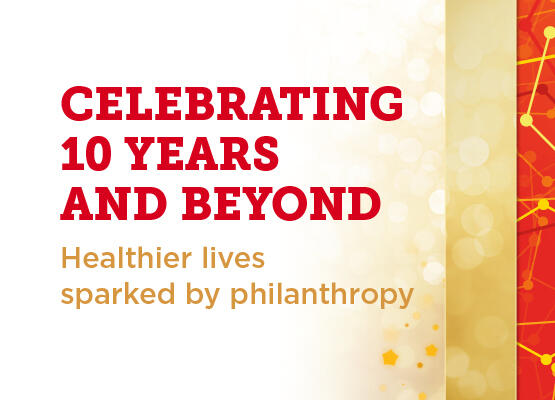June 19, 2024
How a chance meeting and a transformational gift changed one essential tremor patient’s life forever

When John Mac Donald met Harley Hotchkiss at a Calgary Flames game in 2004, he had no idea the local philanthropist would go on to fund brain and mental health research that would later change Mac Donald’s life.
The pair were introduced by Mac Donald’s brother-in-law who knew Hotchkiss (part owner of the Flames) through the hockey world.
“We ended up going to this hockey game together and you couldn’t find a more accommodating person,” recalls Mac Donald. “A very unpretentious individual and a beautiful person who was just amazing.”
That same year, Harley Hotchkiss, LLD'96, together with his wife, Rebecca, and family, made a transformational gift to the University of Calgary’s Cumming School of Medicine, establishing the Hotchkiss Brain Institute (HBI).
Hotchkiss was always interested in the mysteries of the brain, according to his daughter Brenda Mackie. He had been involved in medical philanthropy for a number of years so it was no surprise to his family that he would invest in brain research at UCalgary’s medical school.
“That was a natural fit for him. I think he and my mother both also truly believed that it was almost a responsibility to make the community better. And he thought that this was a good way to have impact on many, many people’s lives,” says Mackie.
Mackie now leads The Hotchkiss Family Foundation and is chair of the Strategic Advisory Board for the HBI.
“Our family is really proud to be associated with such an amazing institution,” says Mackie. “We’re really, really grateful for not just the support that we’ve had from the community, but also we’re really proud of the researchers and what they’re doing and how the trainees and the graduate students are given so many opportunities.”
Hotchkiss passed away in 2011 at the age of 83, but his legacy lives on.

Harley Hotchkiss
The family’s foundational gift has helped spark life-changing research, including work involving High Intensity Focused Ultrasound (HIFU) — a procedure Mac Donald underwent in June 2022 at the age of 69 for an essential tremor. The neurological condition causes involuntary and rhythmic shaking and affects Mac Donald’s hands.
“At the time, I didn’t realize I’d be going for this operation and I didn’t know the money that (Harley) had contributed to the Hotchkiss Brain Institute (would benefit me). But it has and I couldn’t thank him enough,” says Mac Donald, sharing his story with us in a suite at a northwest Calgary indoor golf centre.
With no prompting, Mac Donald whips out his wallet and pulls out something very special — Harley Hotchkiss’s business card. He’s held onto it for two whole decades as a memento of their meeting.
“That’s the impression he made on me. He was an extraordinary person,” says Mac Donald, emotion filling his voice.
- Read how all the research institutes at the Cumming School of Medicine are sparking healthier lives through philanthropy
World leader in stroke research and education
As it marks the 20th anniversary of Hotchkiss’s gift, the institute has countless examples like this to celebrate. One of seven research institutes at the Cumming School of Medicine (CSM), the HBI brings together more than 300 scientists from nine faculties across the university to study basic population health and clinical sciences. The institute also leads UCalgary’s Brain and Mental Health research strategy.
Institute neurologists and scientists at the Calgary Stroke Program are international leaders in stroke research and education. In 2015, this team led an international trial in clot removal therapy that revolutionized how stroke is treated around the world. While strokes are typically treated with drugs that dissolve the clot, the ESCAPE trial showed that by mechanically removing the clot within 90 minutes, patients with ischemic acute stroke recovered significantly faster with fewer complications. The procedure increased their likelihood of surviving to 50 per cent and the trial was so successful it ended early. This treatment is now a standard of care for a particular type of stroke.
“Whole health systems have been changed; whole communities are healthier because we proved this treatment works,” says Dr. David Park, PhD, director of the HBI and an internationally recognized expert in molecular biology who studies Parkinson’s disease.
The stroke team continues to iterate on several of its past discoveries, further advancing stroke care. It has made Calgary a top global destination for training clinician-researchers in stroke.
Park says this is just one example of how the HBI is a global leader.
“I think what is really important is both at a foundational research level and at a clinical research level, we’ve tremendously changed understanding of how the brain works and how disease affects the brain. This has led to the development of new treatments that are directly benefiting patients.”
Another example is treating mental health and depression with transcranial magnetic stimulation (TMS) technology through the HBI’s research program known as the Non-invasive Neurostimulation Network (N3). This area of research is funded in part by Geoff Cumming, who made a historic $100-million gift to UCalgary’s medical school in 2014.
By using TMS, researchers can target small regions of the brain in a non-invasive and safe way. Health Canada has approved this treatment for major depressive disorder. HBI’s researchers are making this treatment dramatically more effective by combining TMS with new strategies to make the brain more receptive.
One of these strategies includes using the antibiotic D-Cycloserine (DCS) alongside TMS, which appears to increase the brain’s response to treatment. A 2022 trial showed almost 75 per cent of patients responded to this combination compared to just 30 per cent treated with TMS alone.
In 2012, the Mathison Centre for Mental Health Research and Education was launched at the HBI to further advance the diagnosis, treatment and prevention of mental health disorders in children, youth and emerging adults. It was made possible by a gift from Ronald P. Mathison.
Changing lives through brain research
Research happening at the HBI is also further advancing treatment for movement disorders such as Mac Donald’s. Calgary is the only site in Western Canada where HIFU, the Health Canada-approved procedure Mac Donald underwent, is performed.
Mac Donald had been experiencing symptoms of shaking on his right side for a while, but it wasn’t until 2012 when things escalated. The Airdrie man, who worked in auto financing, had difficulty using the computer, writing his name and holding a cup of tea. The shaking got so bad he stopped playing golf, a sport he loved, and he started to decline social invitations.
“You feel like you're going to make an embarrassment of yourself, sitting at a table trying to get the fork to your mouth. Not a fun thing to do when you're trembling and you're shaking,” he says.
The drugs he was prescribed weren’t having any effect, so he was ready to try anything. On June 14, 2022, he had the HIFU surgery. After having his head shaved, he had a brace screwed into his skull so he wouldn’t move once he entered the MRI machine.
With the help of magnetic resonance guided focused ultrasound (MRgFUS), the surgeons were able to see his brain with real-time imaging and target a beam of high intensity ultrasound to the area responsible for his tremor. Each treatment lasted 15 to 20 minutes after which Mac Donald would be brought out and asked to draw a circle and straight line.
After approximately the 10th treatment, something felt different.
“I remember I'm in there and I'm smiling, because I'm doing something I've never been able to do. I’m drawing perfect circles and a perfect, steady line. It was awesome,” recalls Mac Donald.

John Mac Donald is able to enjoy a game of golf again thanks to HIFU surgery.
Since the surgery, Mac Donald has been able to do everything he used to enjoy.
“My golf game has improved since having the operation quite dramatically,” he says, adding it’s the little things that make such a huge impact.
“This treatment is the greatest thing that's ever happened to me.”
The HBI’s HIFU research has been generously supported through the Rob McAlpine Legacy Initiative, as well as a grant from the Cumming Medical Research Fund and leveraged further with a Canada Foundation for Innovation grant.
Family legacy lives on

Hotchkiss’s gift also sparked a generous donation from his good friend, energy magnate T. Boone Pickens, in 2008, and a gift from his estate in 2023 — the American philanthropist’s only giving in Canada. The momentum created at the institute from these gifts has also inspired hundreds of other donors who have made gifts both large and small, all contributing to healthier lives.
Park says Hotchkiss’s legacy continues to impact the world-leading research being done at the HBI today.
“It started with Harley, and the foundation he created, and now continues with his children and grandchildren. The support of the Hotchkiss family is so important because it brings continuity to the original vision of the HBI,” says Park.
“It’s an exciting time for neuroscience. The HBI has been leading the charge since our inception 20 years ago, and we will continue to do so for the decades to come.”
In 2024, the Cumming School of Medicine (CSM) at the University of Calgary is celebrating 10 years of shaping healthier lives sparked by philanthropy, thanks to Geoff Cumming’s historic $100-million gift. The medical school’s seven research institutes are marking up to three decades of national and international excellence, powered by the generosity of their founding families and support of CSM donors both large and small. Groundbreaking discoveries by each institute have directly benefited children, youth and adults in Calgary, across the country and around the world. Together, our community has helped propel UCalgary to its ranking as a top research university in Canada while strongly positioning the university on the global map for health research.







